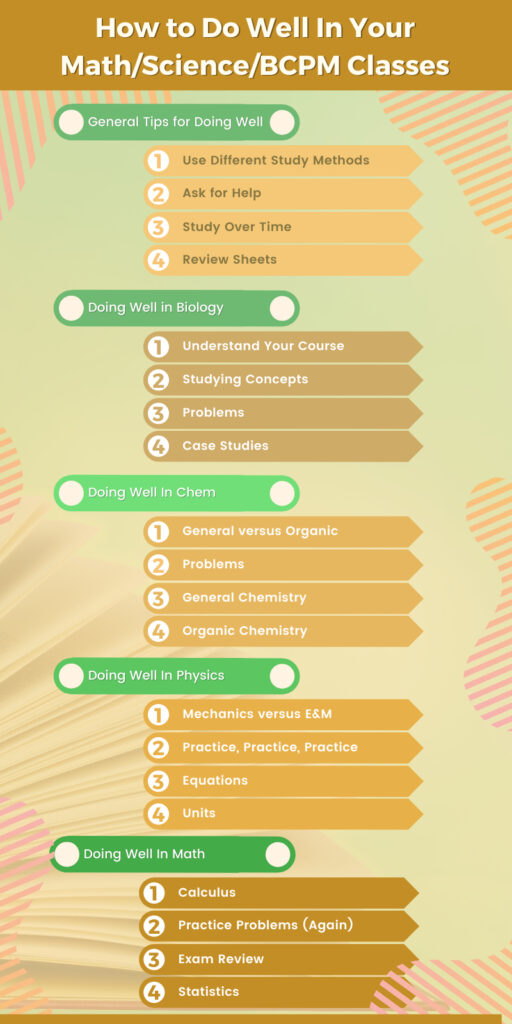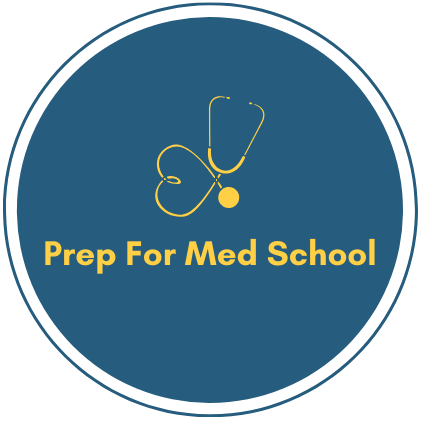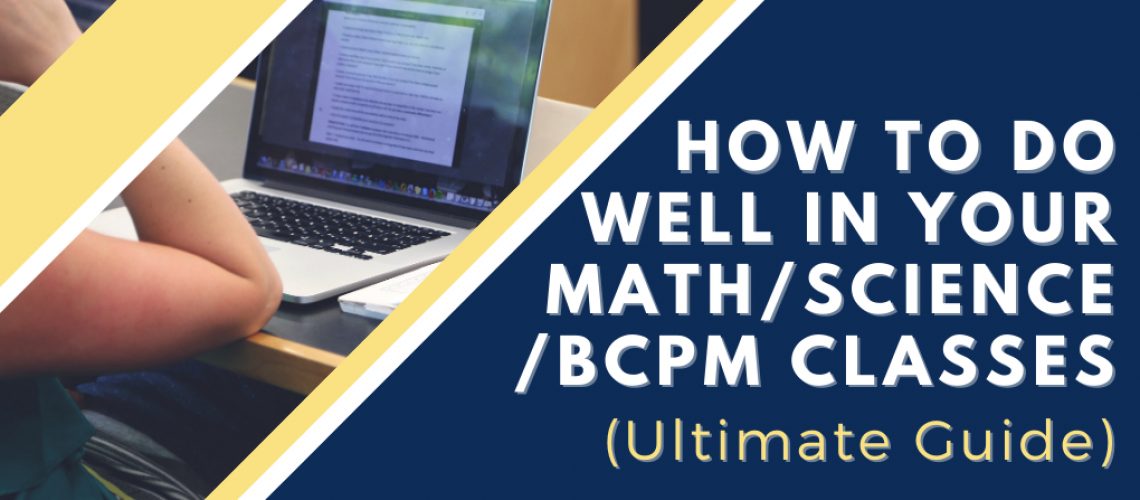Science courses in college are essential for premed students. Not only are they required for medical school admission, but they also are heavily tested on the MCAT. Your science GPA is also sometimes looked at separately from your overall GPA when schools consider you for admission.
Doing well in these courses, specifically biology, chemistry, physics, and math, will help you establish a good foundation of knowledge for the MCAT as well as for your medical studies.
The best method of success is the one that works for you, so if my strategies are not helpful to you, stick with what works. Everyone learns differently, and this article is only my suggestion on how to do well in these courses.
As a biology major and chemistry minor, I took many science courses in college beyond medical school requirements. I was able to get a 4.0 in all of the courses by following the tips below. I hope that this article can be helpful for anyone looking to do better in these courses.
General Tips for Doing Well
Tip 1: Use Different Study Methods
You cannot master all courses using the same study methods. Realize what works best for different types of classes, and customize your studying to the course.
In general, I like to think of it as studying in a manner close to the testing method. Will the exam be a bunch of problems? Then do lots of practice problems. Will the exam test your understanding of a complex process? Then study by reviewing that process until you have it down. If you need to present information quickly, then use flashcards to memorize what you need to know.
What is important is that you study actively. Make sure you are engaging your brain in different ways to absorb and learn the material. Active recall is one way to do this.
Tip 2: Ask for Help
For any course, falling behind on material can be detrimental. I know many students put off going into office hours or tutoring. Do not let this be you.
There is no shame in asking for help, and it will only be beneficial in the long run. Professors are there to help, so go in as often as you need to get questions answered. If you need more help, find a study group or tutoring on your campus.
Most campuses offer students many resources, often at low or no cost, so make sure to utilize them. The sooner you get help, the faster you can catch up and be on track to succeed in a course.
Tip 3: Study Over Time
Procrastination is the enemy of success in college. Beginning to study early for an exam or starting a project ahead of the deadline will save you time and energy.
In addition, studying content over a long period of time, aka spaced repetition, better facilitates learning. Start reviewing the material as soon as you learn it. This will save you time the night before the exam and give you more time for more meaningful studying.
Not only will this help you with your exams, but learning via spaced repetition will help you retain the material for longer. This will be useful for both cumulative final exams, as well as the MCAT.
Tip 4: Review Sheets
When reviewing for exams, I apply one step no matter which course I am studying for. This step is making review sheets, a useful habit that my high school calculus teacher taught me.
Review sheets essentially condense down all the material for an exam onto one or two sheets of paper. It is a great way to look through your notes and understand what the main concepts and equations are.
You can think of it as making a cheat sheet to take into the exam with you, even though you will not be able to take it in. You want to make it concise yet thorough. This exercise helps you review and gives you a convenient page to look over that contains all of the material for an exam.
Doing Well in Biology
Tip 1: Understand Your Course
Not all biology courses are the same. Some are more content-based, while others can be more problem-based. This difference affects how you study, so make sure to take this into account. It might take time to figure out how the professor tests material on exams or other graded assignments.
Tip 2: Studying Concepts
In most cases, I would say that biology courses are more concept-based than the other science classes. Exams often involve explaining processes, working through case studies, etc.
You can learn some material by memorization. For me, flashcards are the best way to memorize lots of material. For courses such as anatomy, where you need to remember hundreds of structures’ locations and names, this is a good strategy.
A lot of biology is learning more complex processes. I find drawing out and explaining the concepts to others to be very helpful. After reviewing your notes, attempt to draw out the process without any reference, then check your work. Do this again and again as you study until you know the process forwards and backward.
Tip 3: Problems
Some biology courses, or even just individual units, utilize problems, more like what you would see with physics or chemistry. These problems often require going through a particular method to reach the correct answer.
The best way to study for this is to do as many practice problems as possible until you are confident in the material. These problems could come from assigned homework, extra textbook problems, or other sources.
Many biology courses will include some form of problems at some point. In particular, genetics is a course that stands out to me for having lots of problems on the exams. For the intro courses, these problems might include Punnett squares, pedigrees, trophic level energies, the genetic code, and more.
Tip 4: Case Studies
Another widespread testing method for biology is case studies. Case studies are a great way to test material in new situations. These can be tricky, as they do require a deeper level of understanding.
The key to doing well on a case study is to have a solid understanding of the underlying material. When you see the case study, look for anything that looks familiar from what you studied. Think about any related concepts that there could be questions about.
If you see brand new material, the professor does not expect you to have prior knowledge about it. You will be able to answer all the questions with the material you learned, so do not freak out when you see new content. All the information you need about new content is in the case study.
Stay calm and be patient with case studies. With practice, you can learn to master them.
Doing Well In Chem
Tip 1: General versus Organic
For most premedical students, the main chemistry courses you will take are general chemistry and organic chemistry. These subjects are quite different, and many people will find one easier than the other.
Both types of chemistry are typically problem-based. However, learning the content can be quite different between the two. The main difference, to me, is that organic chemistry requires a bit more memorization before you can attempt the problems.
Tip 2: Problems
For any chemistry course, practice problems will be highly beneficial. Whether it is assigned homework problems or problems you find in a textbook or practice exam, there is no better way to prepare for a chemistry exam.
For chemistry, practice problems are a great way to assess where you are at with mastering the material. They also are a great way to take the knowledge gained from lecture or the textbook and figure out how to apply that to questions.
Ideally, I would recommend learning the concepts first and then leaving plenty of time for practice problems leading up to your exam.
Tip 3: General Chemistry
General chemistry is a lot like physics, in terms of there being many problems and often a lot of math. However, do not forget about the conceptual side of chemistry. It is often necessary to understand why you use a particular equation or why a reaction would proceed in a certain way.
Attend lectures and go to office hours or study sessions if you need to. Often, people get tripped up with general chemistry because they do not know how to attack a problem. Having a greater understanding of the material and the question’s circumstances can help you know where to start.
Another note about general chemistry is that it spans a wide range of topics. You might find some harder or easier than others. Be prepared for the next unit to be more challenging and take more studying time. Don’t give up if you suddenly stop understanding the material. Just make sure to ask for help as soon as you need it.
Tip 4: Organic Chemistry
Organic chemistry is a unique subject. To me, it seemed different than any other course, chemistry or otherwise, that I took as an undergrad. Do not let organic chemistry scare you. Yes, the material can be quite difficult. But it is still a chemistry course, and you can master it like anything else.
My advice for organic chemistry is to stay on top of the material. Regularly review what you learned in lecture, and make sure you actually understand it. Seek help as soon as possible if you start getting confused or just have questions. Organic chemistry builds on itself continuously, so missing a concept will lead to not understanding new material down the line.
Another essential component is to make sure you know what is going to be on an exam. Flip through your notes and write out all the mechanisms you need to know. This gives you a comprehensive list of what you need to know to succeed on the exam.
In terms of studying for exams, I would sit with a whiteboard and draw out reaction mechanisms until I knew them by heart. I quizzed myself over reagent names and nomenclature. I would then tackle as many practice problems as I had time for. If I came across concepts that I was not understanding or found mechanisms that I had forgotten, I would make sure to review those until I knew them.
The good thing about organic chemistry is that, in most cases, putting in good study time and practice will slowly but surely lead to understanding. It takes a lot of time, but it is possible to succeed if you do the work.
Doing Well In Physics
Tip 1: Mechanics versus E&M
Most premedical students will take two semesters of physics. The first semester is mechanics and focuses on more of what you can “see”: forces, acceleration, etc. The second semester is E&M, which stands for electricity and magnetism, and can seem a bit more abstract.
Both semesters’ content builds on themselves, and both have a variety of units that might seem easier or harder for different people. It is important to stay on top of the work so that you do not fall behind as new content builds on old content.
In this same vein, some units might be harder for you than others. Be prepared for certain weeks of physics taking more time to master than others.
Tip 2: Practice, Practice, Practice
While physics has many concepts and theories behind it, I find practice problems to be the best way to spend study time. It is important to understand why things occur, so make sure to attend lectures, read the textbook, and ask questions as needed. However, physics exams are generally composed of problems, and practicing these is the best way to prepare.
Most physics classes will include assigned homework problems. Make sure you do these thoroughly and that you understand the solutions. Often professors will use very similar questions on the exam. Feel free to do more problems than assigned if you are not yet understanding.
If you have access to a solutions manual for the homework problems, only use it to check your work. Looking through a solution and copying it down is not the same as being able to complete a problem from start to finish.
Tip 3: Equations
Physics typically includes a lot of equations. For me, the professor provided the equations on the exam. I would expect that this is the case for most intro physics courses.
However, just because you have the equations does not mean you know how to use them. Spend time with the equations doing practice problems to make sure you understand how to use all of them. Go through the list of equations given to you and make sure you know what each one is for and what each variable represents.
Tip 4: Units
Understanding units is invaluable for succeeding in physics. Always include units in your work, and make sure they cancel out to yield the units requested by the problem. Getting at least the units correct is a relatively simple way to score some points on an exam.
If you aren’t sure where to start with a problem, look at the numbers given to you. See what units each value is in, and figure out if there is any way the units could cancel out to provide you with the answer you need.
Doing Well In Math
I will preface the math section by saying that I did not take calculus in college. I had AP credit from high school. I did take statistics at my university. So, I based these tips on how I succeeded in my high school calculus courses.
Tip 1: Calculus
Calculus is one of those subjects, like organic chemistry, that can be exceedingly difficult. To some, it just makes sense, but to others, it seems like another language. If you fall into the latter group, do not lose hope. Putting in lots of practice and seeking help can lead to success.
Another thing about calculus is that it builds on itself. Most premeds take calculus one and two. Think of these as one continuous course. The foundations you learn in the first semester carry all the way through to the end of the second semester.
Tip 2: Practice Problems (Again)
As I have said for many of the other subjects here, practice problems are essential. Just like with physics, calculus exams are question-based. Do yourself a favor by practicing in a manner similar to the exam. This means doing many practice problems until you fully understand how to get the correct answers.
Most math courses assign homework problems. Take these seriously. Complete them without any solution guides, and only look at solutions to check your work. You do not get a solutions manual on the exam, so make sure you know how to solve problems without one.
Exam questions are often very similar to the homework questions, so understanding them will be very beneficial.
Tip 3: Exam Review
My favorite way to prepare for a calculus exam was to create a review sheet, as I described at the beginning of this article. Write down the types of problems you have learned to do and any relevant equations or methods.
Review this sheet often, and make sure you know all of the general equations or steps to solving problems. If you need to reference the sheet while doing practice problems, make sure you study enough to get to the point where you no longer need to reference it.
Tip 4: Statistics
While most medical schools do not specifically require statistics, they often recommend it, and many premeds will take statistics as an undergraduate. For some reason, I thought statistics would be relatively easy, but statistics was one of the most challenging courses I took as an undergraduate.
For some people, it makes sense, but for most people I know, statistics can be very difficult. My biggest advice is not to underestimate it. Stay on top of the material from day one. The material is quite different from other math courses, so do not feel bad if you need help understanding it. Use whatever resources you have access to in order to help.
Conclusion
Science courses are challenging. Everyone will have classes that trip them up and require more time to succeed. As long as you stay on top of the material, study effectively, and ask for help when you need it, you will be on a good track to doing well in your science courses.
I hope that some of these tips are helpful for you going forward. Keep in mind that this is just what worked well for me. The best study method is the one that works for you.
Remember that getting A’s in every science course is not necessary to attend medical or graduate school. Do your best, and be proud of what you accomplish.





